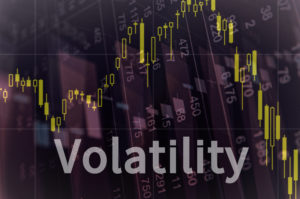Forex and volatility go hand-in-hand. Forex market volatility is determined by the movement of a Forex rate over a period. Forex volatility, or real volatility, is often measured as a normal or normalized standard deviation, and the term historical volatility refers to the price variations observed in the past, while implied volatility refers to the volatility that the Forex market expects in the future as indicated by the price of the Forex options. Implied Forex volatility is an actively traded options market determine by the expectations of Forex traders as to what real Forex volatility will be in the future. Market volatility is a critical component of a Forex traders evaluation of a potential trade. If the market to too volatile, the trader might determine that the risk is too high to enter the market. If market volatility is too low, the trader might conclude that there is not enough opportunity to make money so he would choose not to deploy his capital. Volatility is one of the most critical factors that a trader considers when he is deciding on when, and how, to use his capital. If a market his highly volatile, a trader might choose to deploy less money then if the market was less volatile. On the other hand, if volatility is low, a trader might decide to use more capital because lower volatility markets might offer less risk.
Search Results for: volatility
Forex Funds and Managed Accounts are Popular Alternative Investments.
Forex funds and managed accounts have become popular alternative investments. The term “Alternative Investments” is defined as investment securities trading outside traditional investments like stocks, bonds, cash, or real estate. The alternative investment industry includes:
- Hedge funds.
- Funds of hedge funds.
- Managed futures funds.
- Managed accounts.
- Other non-traditional asset classes.
Investment managers are known for delivering absolute returns, despite market conditions. Using strategy-driven and research-backed investment methods, alternative managers try to provide a comprehensive asset base and benefits such as less risk through lower volatility with the probability of improved performance. For example, currency funds and managed account managers are in the business of delivering absolute returns regardless of how the traditional markets, such as the stock market, are performing.

Forex fund manager’s performances will not be correlated to any of the conventional asset classes listed above. For example, if the US stock market is down, most US equity advisor’s performance will be down. However, the direction of the US stock market will not affect a Forex fund manager’s performance. Consequently, adding a currency fund or managed account to a portfolio of traditional investments, such as equities, stocks, bonds, or cash, is an excellent way to diversify a portfolio and potentially decrease its risk and volatility profile.
The Sharpe Ratio and Risk Adjusted Performance
The Sharpe ratio is a measure of risk-adjusted performance that indicates the level of excess return per unit of risk in a Forex Funds returns. In calculating the Sharpe ratio, the excess return is the return over and above the short-term, risk-free rate of return, and this figure is divided by the risk, which is represented by the annualized volatility or standard deviation.
Sharpe Ratio = (Rp – Rf)/ σp
In summary, the Sharpe Ratio is equal to the compound annual rate of return minus the return rate on a risk–free investment divided by the annualized monthly standard deviation. The higher the Sharpe ratio, the higher the risk-adjusted return. If 10-year Treasury bonds yield 2%, and two Forex managed account programs have the same performance at the end of each month, the Forex managed account program with the lowest intra-month P&L volatility will have the higher sharpe ratio.

The Sharpe Ratio is an important risk management metric for investors to understand.
The Sharpe Ratio is most often used to measure past performance; however, it can also be used to measure future currency fund returns if projected returns and the risk free rate of return are available.
Forex Funds And The Standard Deviation Measurement
One of the most common measurements used by professional investors when they are comparing Forex funds track records is the standard deviation. Standard deviation, in this case, is the level of volatility of returns measured in percentage terms over a period of many months or even years. The standard deviation of returns is a measurement that compares the variability of returns between funds when combined with data from annual returns. Everything else being equal, an investor will deploy his capital in the investment with the lowest volatility.
About Forex Funds
ForexFunds.com is a website that investors can use to learn more about investing in foreign exchange markets using Forex Funds, including both Forex managed account programs and Forex hedge funds. Forex managed account programs and hedge funds are both designed to help investors diversify their Forex portfolios or used in conjunction to building new portfolios with exposure to Forex, and as a means to capture volatility that typically results in in currencies as a result of international market movements and economic and geopolitical events.
Managed Forex Accounts and Diversified Portfolios

Forex can help decrease risk in an investment portfolio through diversity.
With prudent allocation, a managed Forex account may help reduce the overall risk of a portfolio. A sensible investor should ensure that at least a portion of their portfolio is allocated to an alternative asset that has the potential to perform well when other parts of the portfolio may be underperforming.
Other potential benefits of a managed Forex account may include:
• Historically competitive returns over the longer term
• Returns independent of traditional stock and bond markets
• Access to global markets
• The unique implementation of conventional and non–traditional trading styles
• Potential exposure to as many as one hundred and fifty markets globally
• The Forex market typically has a high degree of liquidity.
If suitable to a client’s objectives, devoting twenty to forty-five percent of a typical portfolio to alternative investments may increase returns and lower volatility. Because alternative investments may not react in the same way as stocks and bonds to market conditions, they can be used to diversify investments across different asset classes, potentially resulting in less volatility and less risk. While it is true that many Forex managed accounts have historically profited, there is no guarantee that an individual managed Forex program will continue to benefit in the future. There is also no guarantee that an individual managed Forex account will not suffer losses in the future.
